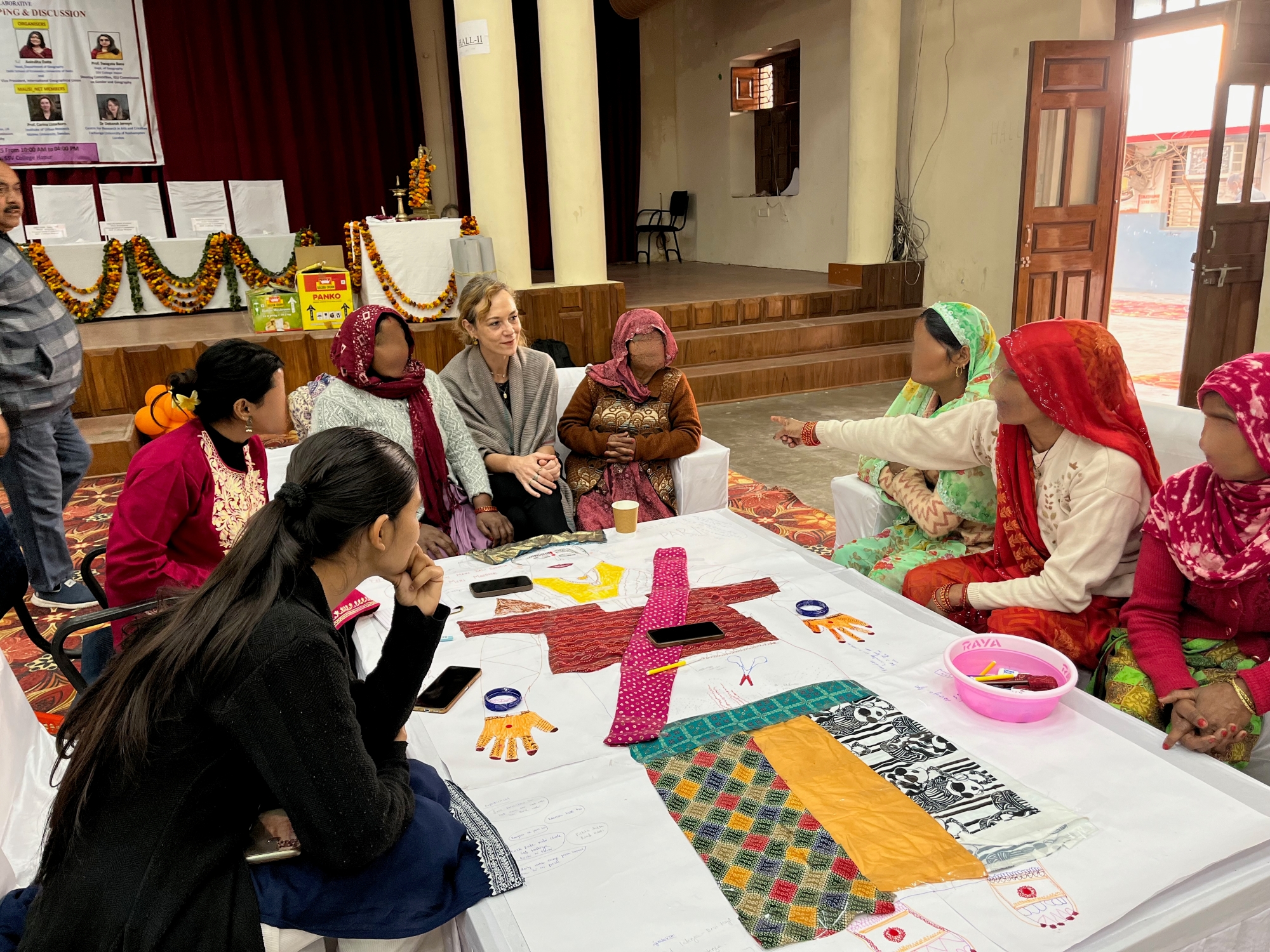The story behind four scholars researching menopause via artivism began with exploring their personal experience individually and as a group. I have known Indian feminist geography scholar Anindita Datta for a long time and had met Swedish urban planning scholar Carina Listerborn in late 2022 through various international feminist geography networks. We were just transitioning out of COVID, and meeting online had become the main way of convening academic exchanges. Seeking to accommodate the time difference between India, Sweden and the UK, we started to talk.
Fast forward a few months. Basking in the sun of an unusually hot Swedish summer in Malmö, we are sketching the vision for a joint project, one where our intersectional experiences of work, care and feminist solidarity could find a place. Despite our differences, an Italian scholar migrated to the UK, a Swedish and an Indian scholar based in the country where they were born, it quickly became apparent we had something in common beyond our academic interests: work was asking us to push harder and do more, while our bodies were begging us to slow down.
Could menopause have something to do with this? We invited Deborah Jermyn on board, the UK-based media scholar who theorized the “menopausal turn” and harnessed our collective knowledge on cities, gender, co-creative approaches and aging to forge an artivist, iterative and inherently feminist research project. This is how the research project “MAUSI Net: Menopause artivism in the UK, Sweden and India” was conceived and eventually financed by the Arts and Humanities Research Council (AHRC).
In recent years the topic of menopause in the UK has gone from being something largely buried and “shameful” in society, to capturing huge public attention across media, politics, medicine, retail and more. This “menopause revolution,” as it has been called, represents a unique opportunity: a decisive turning point for either extending or delimiting how menopause is popularly envisioned, approached, and experienced.
‘Both workshops revealed a concerning
unawareness of menopause symptoms.’
Our research engages this moment as a springboard, to intervene in how that revolution is being shaped widely in the UK and, further, to cultivate a more inclusive and informed reimagining of menopause, empowering those who are in or will undergo menopause, and promoting and integrating awareness of how menopause is configured internationally in other sociocultural contexts.
Its aim, then, is to foster greater dialogue, knowledge, and diversity in the unfolding conversation about menopause, across academic, stakeholder and wider public communities. Furthermore, it foregrounds the real-life experiences and perspectives of women older than age 50, and uses narratives that widen and shift existing discourse from medical and consumerist perspectives to that of menopausal women’s agency and empowerment.
Our artivist approach consists of a combination of art and activism, or artistic activism. Artivism is the use of art-based methods of expression to denounce, cultivate awareness, and motivate change in society. It is articulated through a series of co-creative approaches designed to capture women (and people who identify as women) experiencing menopause, via tools such as 1) comic strips, 2) paper biodegradable stickers to place in key public spaces in Malmö, Delhi and London and 3) body mapping storytelling. Body mapping storytelling is a type of participatory research where participants engage in multimodal and sensory storytelling through tracing a life-size body outline and using it as a canvas to communicate lived experiences.
Toward the end of 2024 the project team reunited in Malmö to run the first international workshop in a marginalized area of the city (Lindängen). Hosted by a local community organization, we co-created comic strips with Middle Eastern migrants, a feminist cartoonist, workshop facilitators, and community translators. Some of the comic strips will be produced as paper biodegradable stickers for artivism interventions in public spaces in the three cities.
Earlier this year we ran the second workshop across 2 days in Hapur, Delhi, NCR (National Capital Region). After a great deal of background work by our Indian colleagues, and support by students and service staff, we used body mapping storytelling to elicit stories from agricultural and domestic labourers experiencing menopause. Despite contextual specificities, both workshops revealed a concerning unawareness of menopause symptoms, silence and invisibility of menopause in everyday language, coexisting feelings of loss and hope, but also finding freedom and solidarity with peers experiencing the menopause transition.
In parallel with these workshops, we are recording podcasts to reflect on the experience of running the project and offer a focus on specific aspects of menopause such as work, inclusion, and representation in the media. The project will conclude with a final event in London during World Menopause Awareness Month on Oct. 9, 2025. The public engagement event featuring a roundtable with academics, artists and stakeholders will inaugurate the exhibition displaying artivism artifacts such as comic strips, body maps and short films. People can then visit the exhibition on the University of Greenwich campus for two weeks after the event.
For additional information and updates on forthcoming publications visit www.mausinet.com.
Elena Vacchelli, PhD, is a professor in Sociology at the University of Greenwich in London; principal investigator on the AHRC funded “MAUSI Net: Menopause Artivism in the UK, Sweden and India” project, and author of several articles, research reports and books on migration, gender and the city.
Photo caption: Body mapping in Hapur, India, February 2025.
Photo credit: Courtesy Elena Vacchelli.













